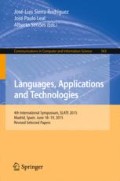Abstract
One of the main artifacts in Requirements Engineering is the Requirements Specification (RS). Throughout the life cycle of the RS arises the need of extracting knowledge in order to facilitate communication with stakeholders. However, this process is not usually efficient. In the different proposals for the representation of an RS conflicts often arise, due to coupling and redundancy of requirements. The Aspect-Oriented paradigm provides principles to address a multidimensional modeling to avoid these conflicts. Knowledge-Engineering is proposed to provide a model of the knowledge needed to allow an efficient extraction of knowledge from the requirements by ontologies. An experimental study has been developed to assess its efficiency when compared with classical methods.
Access this chapter
Tax calculation will be finalised at checkout
Purchases are for personal use only
References
Sommerville, I.: Software Engineering. Pearson Education, Boston (2005)
Jacobson, I., Booch, G., Rumbaugh, J.: The Unified Software Development Process. Addison-Wesley, Reading (1999)
Doerr, J., Kerkow, D., Koenig, T., Olsson, T., Suzuki, T.: Non-functional requirements in industry – three case studies adopting and experience-based NFR method. In: Proceedings of the 13th IEEE International Conference on Requirements Engineering, pp. 373–382. IEEE, New York (2005)
Kiczales, G., Lamping, J., Mendhekar, A., Maeda, C., Lopes, C.-V., Irwin, J.: Aspect-oriented programming. In: Akşit, M., Matsuoka, S. (eds.) ECOOP 1997. LNCS, vol. 1241. Springer, Heidelberg (1997)
Berners-Lee, T., Hendller, J., Lassila, O.: The semantic web. Sci. Am. 284(5), 29–37 (2001)
Brewster, C., O’Hara, K.: Knowledge representation with ontologies: the present and future. IEEE Intell. Syst. 19(1), 72–81 (2004)
Grundy, J.: Aspect-oriented requirements engineering for component-based software systems. In: IEEE International Conference on Requirements Engineering, p. 84. IEEE, New York (1999)
Rashid, A., Sawyer, P., Moreira, A.M.D., Araújo, J.: Early aspects: a model for aspect-oriented requirements engineering. In: Proceedings International Conference on Requirements Engineering, pp. 199–202. IEEE, New York (2002)
Rashid, A., Moreira, A., Araújo, J.: Modularisation and composition of aspectual requirements. In: Proceedings of the 2nd International Conference on Aspect-Oriented Software Development, pp. 11–20. ACM, Boston (2003)
Moreira, A., Rashid, A., Araujo, J.: Multi-dimensional separation of concerns in requirements engineering. In: 13th IEEE International Conference on Requirements Engineering, pp. 285–296. IEEE, New York (2005)
Yu, Y., do Prado Leite, J.C.S., Mylopoulos, J.: From goals to aspects: discovering aspects from requirements goal models. In: 12th IEEE International Requirements Engineering Conference, pp. 38–47. IEEE, New York (2004)
Baniassad, E., Clarke, S.: Theme: an approach for aspect-oriented analysis and design. In: Proceedings of the ICSE 2004, pp. 158–167. IEEE, Washington (2004)
Jacobson, I., Ng, P.-W.: Aspect-Oriented Software Development with Use Cases. Addison-Wesley, New Jersey (2005)
Kaiya, H., Saeki, M.: Using domain ontology as domain knowledge for requirements elicitation. In: 14th IEEE International Requirements Engineering, pp. 189–198. IEEE, Los Alamitos (2006)
Jureta, I.J., Mylopoulos, J., Faulkner, S.: Revisiting the core ontology and problem in requirements engineering. In: 16th IEEE International Requirements Engineering, RE 2008, pp. 71–80. IEEE, Los Alamitos (2008)
Velasco, J.L., Valencia-Garcia, R., Fernandez-Breis, J.T., Toval, A.: Modelling reusable security requirements based on an ontology framework. J. Res. Pract. Inf. Technol. 41(2), 119–133 (2009)
Souag, A., Salinesi, C., Wattiau, I., Mouratidis, H.: Using security and domain ontologies for security requirements analysis. In: Computer Software and Applications Conference Workshops (COMPSACW), 2013 IEEE 37th Annual, pp. 101–107. IEEE, Los Alamitos (2013)
Author information
Authors and Affiliations
Corresponding author
Editor information
Editors and Affiliations
Rights and permissions
Copyright information
© 2015 Springer International Publishing Switzerland
About this paper
Cite this paper
Barra, E., Morato, J. (2015). Knowledge Identification from Requirements Specification. In: Sierra-Rodríguez, JL., Leal, JP., Simões, A. (eds) Languages, Applications and Technologies. SLATE 2015. Communications in Computer and Information Science, vol 563. Springer, Cham. https://doi.org/10.1007/978-3-319-27653-3_26
Download citation
DOI: https://doi.org/10.1007/978-3-319-27653-3_26
Published:
Publisher Name: Springer, Cham
Print ISBN: 978-3-319-27652-6
Online ISBN: 978-3-319-27653-3
eBook Packages: Computer ScienceComputer Science (R0)

